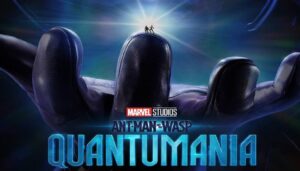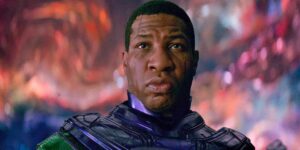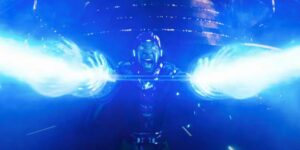
Marvel Studios / The Walt Disney Company
ANT-MAN AND THE WASP: QUANTUMANIA
Starring Paul Rudd (Scott Lang / Ant-Man), Evangeline Lilly (Hope Van Dyne / The Wasp), Kathryn Newton (Cassie Lang), Jonathan Majors (Kang), Michelle Pfeiffer (Janet Van Dyne), Michael Douglas (Hank Pym), Corey Stoll (M.O.D.O.K.), David Dastmalchian (the Voice of Veb), Katy O’Brian (Jentorra), William Jackson Harper (Quaz), and Bill Murray (Lord Krylar).
Directed by Peyton Reed
Produced by Kevin Feige and Stephen Broussard
Written by Jeff Loveness
Music by Chrisophe Beck
Distributed by Walt Disney Studios Motion Pictures
Run Time: 2 hours and 4 minutes
World Premier: February 6, 2023 (Los Angeles, California)
Opening Weekend Box Office: $41 million in North America
Worldwide Box Office: $474 million
Rotten Tomatoes Score: 46%
UPDATE … The arrest and eventual conviction of Jonathan Majors for assault has obviously cast a large shadow over this movie, as well as over the entire Multiverse Saga. While I do some praising of Jonathan Majors for his talent as an actor in this review, let me be clear: I do not condone violence against women, and I have zero respect for anyone that commits the types of crimes that Jonathan Majors has been accused of committing.

Marvel Studios / The Walt Disney Company
Fun Ant-Man and The Wasp: Quantumania Facts
The title of Marvel Studios’ third Ant-Man film was announced as Ant-Man and The Wasp: Quantumania on December 10, 2020, during Kevin Feige’s Marvel Studios presentation during Disney’s “Investor’s Day.” Feige confirmed the returns of Paul Rudd, Evangeline Lilly, Michelle Pfeiffer, Michael Douglas, and Peyton Reed and furthermore announced the additions of Kathryn Newton as Cassie Lang (replacing Emma Fuhrmann, who portrayed Lang in Avengers: Endgame) and Jonathan Majors as Kang.
On July 23, 2022, at San Diego Comic Con, Marvel CCO Kevin Feige announced that the next Avengers film from Marvel Studios would be titled Avengers: The Kang Dynasty and would be released on May 2, 2025. Destin Daniel Cretton (who previously directed Shang-Chi and The Legend of the Ten Rings for Marvel Studios) was hired to direct the film, which would star Jonathan Majors presumably as several Variants of Kang the Conqueror. Also at SDCC, Kevin Feige officially labeled the current three Phases of MCU films beginning with Phase 4 and concluding with Phase 6 as The Multiverse Saga.
In the Marvel Comics, Kang the Conqueror is a time-traveling antagonist of The Fantastic Four and The Avengers and is a descendant of Mister Fantastic / Reed Richards from the 31st Century named Nathaniel Richards. Kang in known by many names in the comics and boasts a multitude of Variants, the most noteworthy of which are Pharaoh Rama-Tut, Scarlet Centurian, Immortus, Iron Lad and Victor Timely. There is also a Prime Kang in the Marvel Comics that wages war against the other Kang’s, some of which are essentially the same person (Iron Lad becomes Kang the Conqueror for instance and Kang the Conqueror becomes Rama-Tut … time travel!) and others who are alternate versions from Alternate Timelines and Universes. There is also a Council of Kang’s in the comics that was founded by Kang Prime.
In the Season Finale of Marvel Studios’ Disney+ series Loki: Season One (titled For All Time. Always), Jonathan Majors made his MCU debut as He Who Remains … a Variant of the Kang character that he would portray in Ant-Man and The Wasp: Quantumania. In Loki: Season One, He Who Remains was revealed as the architect of the Sacred Timeline (a controlled Flow of Time that was policed by the Time Variance Authority and ruled over by He Who Remains). In Loki, He Who Remains explained that the Sacred Timeline was created in an effort to prevent a second Reality-threatening Multiversal War from ensuing between He Who Remains and Multiversal Variants of Himself. The first Season of Loki ended with a female Variant of Loki (Sylvie) slaying He Who Remains and critically rupturing the Sacred Timeline, causing endless Branched Timelines to manifest and birthing an ever-expanding Multiverse. Another Loki Variant (created during The Avengers’ Time Heist in Avengers: Endgame and classified as Loki Variant L1130 by the TVA) decides against sparing the life of He Who Remains at his counterpart’s expense, and also bypasses the Universal reboot that He Who Remains had arranged for, and instead allows the Temporal Loom that made the Sacred Timeline function properly to overload and explode after which Loki imbued the dying Timelines with his magic, remolding the Timelines into a new Multiversal Tree, at the center of which he served as the Guardian of this new Multiversal structure. Loki’s actions restored Free Will to a Multiverse that had been denied such a thing by He Who Remains and the Timelines that comprised Loki’s Multiversal structure were allowed to freely expand as they would. While the threat of the Variants that He Who Remains warned about prior to His demise did come to fruition, the TVA were able to keep said threat at bay. However, as Kang the Conqueror warned in Quantumania, an even greater threat arose in the form of Incursions, the colliding of two Universes with each other that leaves one, or both destroyed.
The fate of Kang the Conqueror in Ant-Man and The Wasp: Quantumania was something that was consistently bashed by fans and critics alike. Many reasoned that having Kang get beaten by Ant-Man tainted his effectiveness as the sort of villain that the next Avengers movie would revolve around. While Kang appears to die in Quantumania, many theorized that Marvel Studios would, in a future project, reveal that he survived the incident and that he perhaps even gained more power as a result of it. A long string of events have occurred since the release of Quantumania however, that may result in us never knowing either way, as the Marvel Studios team have pivoted away from Kang as the Big Bad of the next Avengers film.
In Ant-Man and The Wasp: Quantumania, we are introduced to countless Variants of Kang during the mid-credits, including Rama-Tut, Scarlet Centurian, Immortus, and the Kang Dynasty / the Council of Kangs. The Kang Council scene was adapted directly from a famous comic book panel that appeared in Avengers #267 by Roger Stern and John Buscema. The post-credits scene is taken directly from Loki: Season Two and features Victor Timely.
Ant-Man and The Wasp: Quantumania serves as the MCU introduction of M.O.D.O.K. The name in the comics is an acronym that stands for Mental Organism Designed Only for Killing. In the comics, M.O.D.O.K. is traditionally a former A.I.M. Employee named George Tarleton. He underwent an experiment that was designed to increase his intelligence. The experiment was a success, but he was left with an enormous head and a stunted body and was relegated to a mobile chair for movement. From there, a weaponized M.O.D.O.K. kills his creators and takes over A.I.M., emerging as a sort of ultimate killing machine. In the Marvel Cinematic Universe, M.O.D.O.K. is Darren Cross, portrayed once again by Corey Stoll. At the end of the first Ant-Man film, Cross was presumed dead after fighting Scott Lang in Cassie Lang’s bedroom. Scott caused Cross’s body to implode and unbeknownst to Scott, Cross ventured into the Quantum Realm where he was discovered by Kang, nursed back to health and transformed into M.O.D.O.K. with his massive head and tiny body being the results of the method that Scott used to vanquish him.
In its first week of release, Ant-Man and The Wasp: Quantumania became only the second MCU movie to be certified as rotten by Rotten Tomatoes. The film boasts a 46% Approval Rating which puts it under Eternals (47%) for the dubious honor of being Marvel Studios’ worst score of all-time for an MCU film.
On September 5, 2023, Scott Lang’s book Look Out for the Little Guy (as seen in this film) was released, providing MCU fans with a detailed glimpse into the life of Scott Lang / Ant-Man and revealing new details about life in the MCU during the events of Avengers: Endgame and beyond.
Mere weeks after the release of Ant-Man and The Wasp: Quantumania, Jonathan Majors was arrested for assault that pertained to a domestic violence case. Majors was convicted near the end of the year and was promptly fired by Marvel Studios following the conviction and the Kang Dynasty part of the upcoming fifth Avengers film was dropped. At the 2024 Sand Diego Comic Con, Marvel Studios revealed the new title of the film previously known as Avengers: The Kang Dynasty: Avengers: Doomsday. The announcement came complete with the reveal that iconic Iron Man actor Robert Downey Jr had been cast to portray Doctor Doom in the film, replacing Kang (and his Variants) as the movie’s intended Big Bad.
Ant-Man and The Wasp: Quantumania was released on Blu-ray, DVD, and Ultra HD Blu-ray on May 16, 2023, and dropped on Disney+ on May 17, 2023.

Marvel Studios / The Walt Disney Company
My Ant-Man and The Wasp: Quantumania Review
Ant-Man and The Wasp: Quantumania is a film that has been greatly hindered after the fact by its poor reception and the legal troubles of one of its primary stars. In my initial viewing experience, I was taken aback by the visuals and liked that the Quantum Realm was revealed to be a fully fleshed-out world that existed beneath the MCU 616-Universe with a society and culture and plenty of its own problems. The way it was presented, it might as well have been an alien planet with all of the different creatures and entities and architecture and technologies, and I was into it. I was also very into the performance of Jonathan Majors. He was phenomenal as Kang the Conqueror and he not only steals every scene that he is in, but almost single-handedly makes this film watchable. In the time since, complimenting Jonathan Majors has of course, become taboo, but he was exceptional as Kang throughout this movie.
That being said, Ant-Man and The Wasp: Quantumania launched what was probably the worst calendar year in the history of Marvel Studios: 2023. Kevin Feige and his team would churn-out three of their worst-received productions ever in 2023. Quantumania was the first. It had the worst Rotten Tomatoes score for any MCU film produced by Marvel Studios and its $476 million box office was very disappointing. Next came Secret Invasion in the Summer and it too was deemed “rotten” (53%), with its finale in particular getting heavily bashed and receiving a staggering 7% score on Rotten Tomatoes. In the Winter, came The Marvels. It landed a 62% score on Rotten Tomatoes but was the least-grossing MCU film produced by Marvel Studios of all-time, accumulating a mere $206 million worldwide. All of this, AND they lost their intended Big Bad of The Multiverse Saga. The critical and financial (and legal) troubles of 2023 combined with the lengthy writers and actors strikes of that same year to give Marvel Studios pause and provoke them to reconsider some things about their creative direction.
All of this has combined to make Ant-Man and The Wasp: Quantumania one of Marvel Studios’ most inconsequential productions, and on rewatch, it just isn’t all that enjoyable.
On to the plot, in the MCU year of 2026, Scott Lang is enjoying life as a superhero celebrity, but he’s juggling the frustration of having missed so much of his daughter Cassie’s life. He spent two years of her childhood in jail of course and then missed five more years because of Thanos. Cassie grew up during that time, and she has her own ideas and ambitions that Scott isn’t entirely comfortable with. A lot of that involves following in his footsteps, be that in getting locked up by the police or using Hank Pym’s shrinking technology. Cassie wants to be a superhero, like her dad, and we learn early in the film that she is a brilliant young woman that spent the five years during which her dad, Hank, Hope, and Janet were gone, studying the Quantum Realm and all of Hank’s research journals. This culminated in her inventing a machine that could enable Quantum exploration! After the Blip, Hank and Hope both encouraged Cassie in her ambition behind the backs of Scott and Janet. Scott was wrapped up in his celebrity status after all, and Janet was frustratingly tight-lipped on her Quantum experiences. All of this comes to a head when Cassie activates her machine, provoking Janet into a panic. Then, all five of them are sucked into the Quantum Realm.
There, Hank and Hope and Scott and Cassie learn just how much Janet Van Dyne didn’t tell them about the Realm, and the biggest secrets involve Kang the Conqueror. He was exiled to the Quantum Realm and crash-landed where he was nursed back to health by Janet. They developed a close friendship, and a mutual respect and Janet helped Kang repair his crashed ship, which is fueled by remarkably advanced technology that allows him to operate the ship through his thoughts. The ship can also take Kang to any PLACE and TIME within the Multiverse, seemingly without creating Branched Timelines where he lands. Kang seems intelligent, kind, and understanding and Janet has only known him as a soft-spoken and patient person up until the point his ship is repaired. She then comes into physical contact with the ship and is able to see into Kang’s mind and she learns that he has a lot of blood on his hands. This entity has wiped entire Multiversal Timelines out of existence! He has murdered trillions! Janet sees Kang as a merciless Warlord. Kang simply sees himself as a necessary Conqueror. Still, Kang offers to take Janet home to her daughter and husband and vows to spare her Universe due to the kindness that she had shown him. Janet cannot allow Kang to leave the Quantum Realm however, as she is fully aware of what he is capable of. So, using Pym Particles, she destroys the Multiversal Core that power his Time Sphere and leaves Kang stranded.
Janet has now made an enemy of Kang, and she makes efforts to flee his wrath, but while entrapping Kang within the Quantum Realm may have been beneficial to the Multiverse as a whole (or, maybe it wasn’t), it certainly was not beneficial to the Quantum Realm, or more specifically, its inhabitants. Kang decided to establish rule over the Realm. If he was to dwell there, he would conquer it and rule it and rule it he did. Wielding his immaculate technologies and tremendous power, Kang would go on to oppress the people of the Quantum Realm and develop a massive city and a robotic army. Oppositions arose and Janet joined the Resistance that fought against Kang, but Kang conquered the Quantum Realm nonetheless, and millions were killed and those who survived fell under his oppressive rule. Then, Janet escaped.
Hank pulled her out of the Quantum Realm and returned her home. For her, it was over … until Cassie caused them to go back. Cassie’s machine sent a signal back into the Quantum Realm that was detected by M.O.D.O.K. and it was he (Darren Cross) who brought Cassie, Scott, Hank, Hope, and Janet into the Realm. Kang of course wants Janet because he knows she has access to the technology that can help repair his Multiversal Core … Pym Particles.
Of course, everyone else that was forcefully brought into the Quantum Realm by M.O.D.O.K. does too and before reuniting with Janet, Kang actually captures Scott and Cassie.
This scene between Scott and Kang and Cassie is amazing with Kang casually bragging about all of the Avengers that he’s killed and threatening to kill Cassie if Scott doesn’t agree to work with him, and what Kang needs Scott for is pretty perfect, for it’s essentially a heist. And that’s what Scott Lang does best!
Scott begrudgingly agrees to help Kang, and, on the mission, he reunites with Hope and reconsiders giving Kang the device that Kang wants back to him. This leads to war of course, and the Resistance rises, and a bunch of giant intelligent ants join the battle, and Scott does all he can to fight Kang the Conqueror. There is some really great stuff between him and Cassie here as Scott proudly acknowledges the hero that Cassie has become and, in the end, a portal is successfully opened through which Cassie, Hank, Janet, and Hope travel back home. Scott is forced to stay behind however in an effort to keep Kang from going through the portal. Scott fights Kang one-on-one and the fight is pretty great; just a lot of Jonathan Majors beating the shit out of Paul Rudd basically, but Hope soon returns to give Scott an assist and they manage to stop Kang by overloading the drive of the Multiversal Core. Kang is then vaporized and presumed dead.
The people of the Quantum Realm have been liberated, and Cassie uses her machine to find Scott and Hope and bring them back home. Scott returns to his (616) Universe with new and exciting stories to tell, but he can’t shake the feeling that something bad is coming.
A mid-credits scene then introduces us to the Council of Kang’s, and three Kang Variants discuss the death of the Quantum Conqueror that they’d previously banished. While looking out over the Multiverse, they suggest that a war is coming. To wage this war, they have summoned every Kang from every Universe!
Even in my initial viewing, before all of the Jonathan Majors stuff came out, there were things that I didn’t like about Ant-Man and The Wasp: Quantumania, and one of the top things was M.O.D.O.K. As a comic book reader and a Marvel fan, I thought seeing M.O.D.O.K. on screen and in live action was sort of cool (particularly before the face is shown), but M.O.D.O.K. is a weird concept and he looks goofy. so, pulling him off in live action was never going to be easy. I thought making Darren Cross become M.O.D.O.K. was a brilliant creative decision and I could tell Corey Stoll had a lot of fun with the role, but M.O.D.O.K. looks ridiculous in the comics and unfortunately, he looked ridiculous in the movie. When the face of M.O.D.O.K. was revealed in the film, several members of the audience around me cackled because he looked undeniably silly. Corey Stoll may have been having fun, but I wasn’t. I did not enjoy his performance, and I didn’t need for the Darren Cross character to get a redemption arc either.
Some of my other non-likes: Evangeline Lilly felt like she was sort of … just there. I thought the Kang’s in the audience during the Dynasty of Kang’s reveal acted too goofy and I wasn’t crazy about the voice of Immortus, I also didn’t like a lot of the dialogue. Ant-Man films are comedies, but a lot of the jokes didn’t land with me in this one. I missed Louis! Lastly, and I guess it doesn’t matter now, but at the time, I was not a fan of the fact that Kang didn’t kill anyone! I mean, you’re following up Thanos here, surely, he could’ve conquered someone in the “Ant Family,” Michael Douglas’ Hank Pym seemed like the obvious choice, but the fact that no member of the main cast fell victim to Kang’s wrath did Kang no favors as a Big Bad and doesn’t help at all with this movie feeling inconsequential.

Marvel Studios / The Walt Disney Company
Highlights of Ant-Man and The Wasp: Quantumania:
Jonathan Majors as Kang
Paul Rudd is Scott Lang / Ant-Man
Michelle Pfeiffer as Janet Van Dyne
Veb
Cassie Becomes a Superhero!
Scott’s post-Endgame celebrity


Leave a Reply